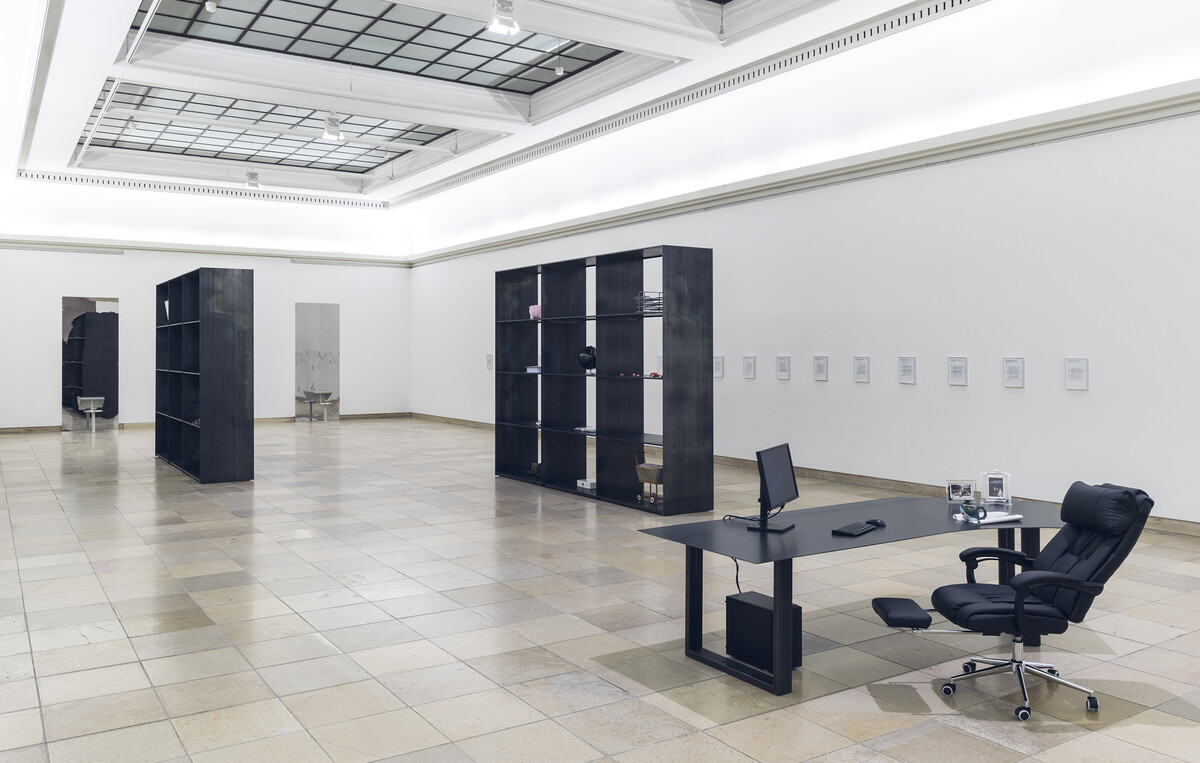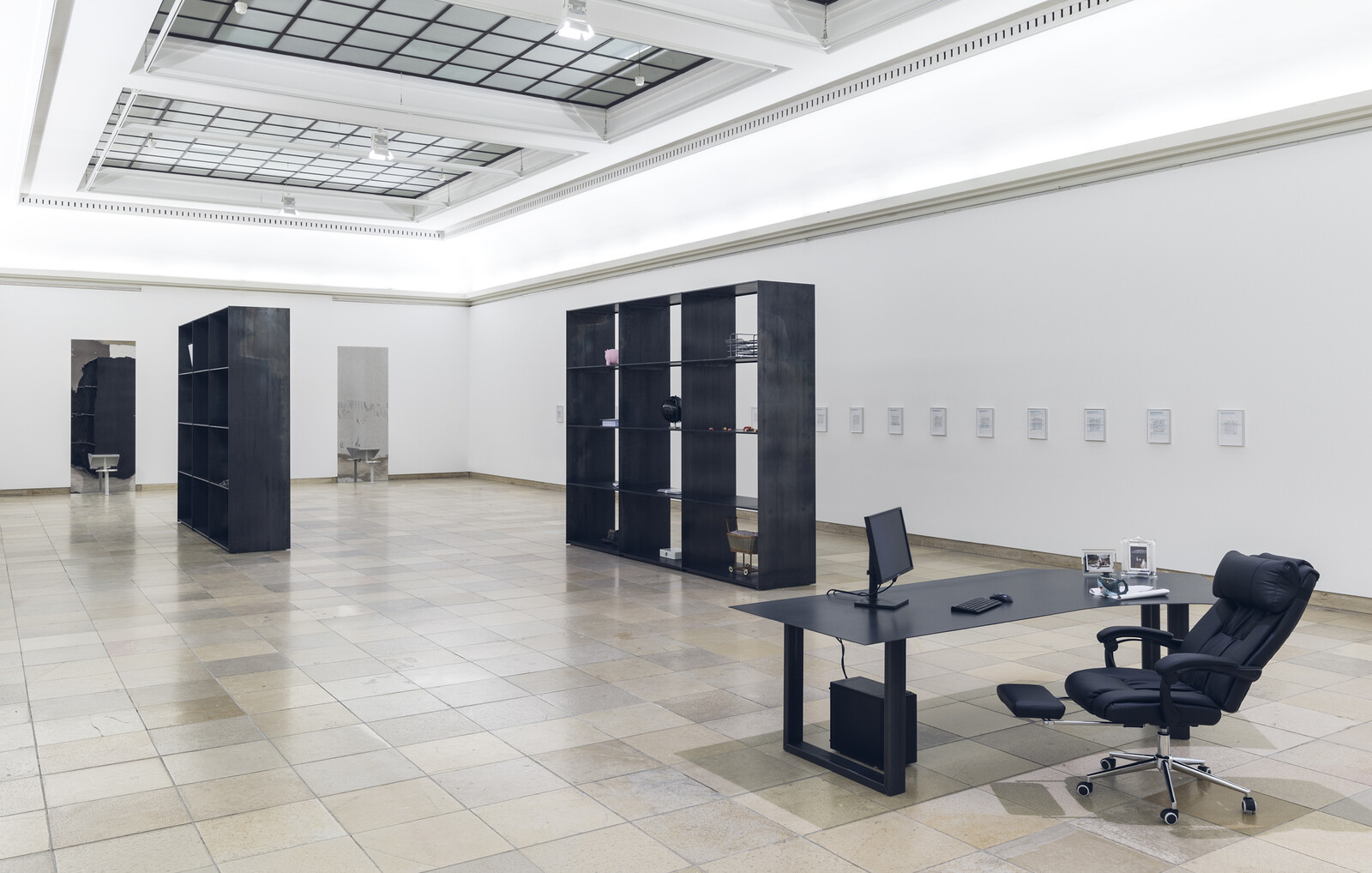“Zugzwang” describes the situation in turn-based games, such as chess, when the compulsion to move puts a player at a disadvantage. In Sung Tieu’s solo exhibition at Haus der Kunst, this becomes a metaphor to describe the asylum process, which compels applicants to provide authorities with information that may later be used against them. Tieu is no stranger to this system. Born in Hai Duong, Vietnam, in 1987, she immigrated to Germany with her mother in the early 1990s, and is now based in London and Berlin.
This experience is indirectly referenced in a set of 31 replicas of official forms (Alekhine’s Defence, all works 2020) that stretch across two of the exhibition’s four walls. Relating to asylum, naturalization, and residency, each of these uniformly framed documents has been edited by the artist to remove any mention of the country where they were issued. Posing basic biographical questions alongside more subjective requests—“[Provide] factual information about the applicant’s intelligence”—these forms aim to assess the “use value” of each claimant, which is in turn balanced against the possible risks, such as ill health or possible criminal activity, which they pose. On each sheet, Tieu has drawn a move from a historic chess match between a grandmaster and an amateur—suggesting that legal asylum isn’t an objective process, as we’re led to believe by the authorities, but a high-stakes game of strategy and wit.
The acute anxiety caused in applicants by the pressure to fill out these forms “correctly” bears very real consequences. One only has to look at resignation syndrome, a condition that causes refugee children to fall into otherwise medically unexplainable, coma-like states, to see the mental strain that can result from the constant threat of deportation. Tieu skillfully suffuses “Zugzwang” with a similar sense of apprehension and foreboding. Dominated by austere furniture in black and silver steel—all of which is based on furnishings from bureaucratic institutions and penal facilities—to enter the exhibition is to feel immediately overwhelmed, despite the room’s sparse layout. A six-channel soundtrack comprising mouse clicks and printer noises (among a cacophony of other related sounds) further heightens the tension.
Also titled Zugzwang, the 20-minute recording is played through a set of six speakers hidden within a quirky collection of artifacts. Placed on one of two freestanding shelves and a nearby office desk, these objects include a piggy bank, a first aid kit, and a globe, as well as framed childhood photographs of the artist with her mother. Speaking in a roundtable discussion before the opening, Tieu said that her aim was to emphasize “how small the human is in the bureaucratic state.” In the installation, this is achieved through scale (the oversized shelves dwarf everything they hold) but also through the mashing together of two incompatible styles; against the cool minimalism of the furniture (one thinks of Donald Judd), these sentimental items appear kitsch.
From the roundtable discussion, it became clear that while some of these pieces are from Tieu’s personal collection, others have been found in offices or sourced on the internet. Further instances of this mixing of fact and fiction recur throughout the exhibition. The installations Borders 2.0 and Manning the Deck are based on two newspaper articles that Tieu created, together with a graphic designer, to ape the look and feel of the real thing. Written by the artist, the first focuses on the phenomenon of bicultural children who are rendered stateless through their parents’ globetrotting, while the second takes the form of an interview with a Brussels-based bureaucrat inspired by the main character in Kazuo Ishiguro’s 1989 novel The Remains of the Day, a faithful butler called Stevens. In the former, we see how differing birthright citizenship rules cause issues in a globalized world; in the latter, it becomes clear that one’s right to citizenship may depend on the temperament of the person who makes the decision. Considered together, these stories portray a bureaucratic state that isn’t only cruel, but also ineffectual.
Tieu has plugged this Stevens with parts of her own biography—his daughter lives in London, like Tieu, and his wife was born in Vietnam, as she was. Ultimately, though, it’s difficult to discern the extent to which Tieu has fictionalized her own experiences. Intriguing rather than frustrating, the result is a welcome rejection of the exceptionalism and spectacle that have characterized many artworks made in the wake of the global refugee crisis, by artists from Candice Breitz to Ai Weiwei. In refusing to tell the particulars of her own story, Tieu rejects a straightforward biographical reading of the exhibition, placing herself instead in solidarity with the larger migrant diaspora. What happened to her isn’t exceptional, she tells us through this expertly crafted exhibition—it’s depressingly common.







